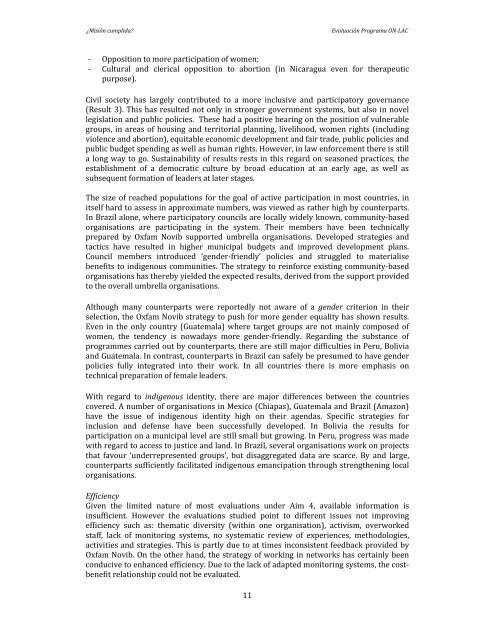¿MISION CUMPLIDA? EVALUACIÓN DEL PROGRAMA DE ... - Novib
¿MISION CUMPLIDA? EVALUACIÓN DEL PROGRAMA DE ... - Novib
¿MISION CUMPLIDA? EVALUACIÓN DEL PROGRAMA DE ... - Novib
Create successful ePaper yourself
Turn your PDF publications into a flip-book with our unique Google optimized e-Paper software.
¿Misión cumplida? Evaluación Programa ON-LAC<br />
- Opposition to more participation of women;<br />
- Cultural and clerical opposition to abortion (in Nicaragua even for therapeutic<br />
purpose).<br />
Civil society has largely contributed to a more inclusive and participatory governance<br />
(Result 3). This has resulted not only in stronger government systems, but also in novel<br />
legislation and public policies. These had a positive bearing on the position of vulnerable<br />
groups, in areas of housing and territorial planning, livelihood, women rights (including<br />
violence and abortion), equitable economic development and fair trade, public policies and<br />
public budget spending as well as human rights. However, in law enforcement there is still<br />
a long way to go. Sustainability of results rests in this regard on seasoned practices, the<br />
establishment of a democratic culture by broad education at an early age, as well as<br />
subsequent formation of leaders at later stages.<br />
The size of reached populations for the goal of active participation in most countries, in<br />
itself hard to assess in approximate numbers, was viewed as rather high by counterparts.<br />
In Brazil alone, where participatory councils are locally widely known, community-based<br />
organisations are participating in the system. Their members have been technically<br />
prepared by Oxfam <strong>Novib</strong> supported umbrella organisations. Developed strategies and<br />
tactics have resulted in higher municipal budgets and improved development plans.<br />
Council members introduced ‘gender-friendly’ policies and struggled to materialise<br />
benefits to indigenous communities. The strategy to reinforce existing community-based<br />
organisations has thereby yielded the expected results, derived from the support provided<br />
to the overall umbrella organisations.<br />
Although many counterparts were reportedly not aware of a gender criterion in their<br />
selection, the Oxfam <strong>Novib</strong> strategy to push for more gender equality has shown results.<br />
Even in the only country (Guatemala) where target groups are not mainly composed of<br />
women, the tendency is nowadays more gender-friendly. Regarding the substance of<br />
programmes carried out by counterparts, there are still major difficulties in Peru, Bolivia<br />
and Guatemala. In contrast, counterparts in Brazil can safely be presumed to have gender<br />
policies fully integrated into their work. In all countries there is more emphasis on<br />
technical preparation of female leaders.<br />
With regard to indigenous identity, there are major differences between the countries<br />
covered. A number of organisations in Mexico (Chiapas), Guatemala and Brazil (Amazon)<br />
have the issue of indigenous identity high on their agendas. Specific strategies for<br />
inclusion and defense have been successfully developed. In Bolivia the results for<br />
participation on a municipal level are still small but growing. In Peru, progress was made<br />
with regard to access to justice and land. In Brazil, several organisations work on projects<br />
that favour ‘underrepresented groups’, but disaggregated data are scarce. By and large,<br />
counterparts sufficiently facilitated indigenous emancipation through strengthening local<br />
organisations.<br />
Efficiency<br />
Given the limited nature of most evaluations under Aim 4, available information is<br />
insufficient. However the evaluations studied point to different issues not improving<br />
efficiency such as: thematic diversity (within one organisation), activism, overworked<br />
staff, lack of monitoring systems, no systematic review of experiences, methodologies,<br />
activities and strategies. This is partly due to at times inconsistent feedback provided by<br />
Oxfam <strong>Novib</strong>. On the other hand, the strategy of working in networks has certainly been<br />
conducive to enhanced efficiency. Due to the lack of adapted monitoring systems, the costbenefit<br />
relationship could not be evaluated.<br />
11



